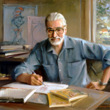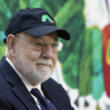Colores de la vida = Mexican folk art colors in English and Spanish
(Book)
J/BILIN JP WEILL
1 available
Copies
| Location | Call Number | Status | Due Date |
|---|---|---|---|
| Central - Kids Bilingual | J/BILIN JP WEILL | Available | |
| Central - Kids Bilingual | J/BILIN JP WEILL | Checked Out | June 15, 2025 |
Description
“Each page captures a sense of wonder, of the vibrancy of color, the imagination of the artist, the name of the hue. Colors take life in this small picture book, perfect for small hands, in an astonishing pairing of visual intimacy and artistic joy that make this one of the most distinctive recent books on color—in English or otherwise.” —Papertigers.org
This book truly did take a village of artists, scattered all around mountain villages in the beautiful state of Oaxaca. Fifteen in fact! Go to our website to see who carved what lovely animal. And, please, imagine the adventurous Cindy Weill traipsing from village to village in search of these wonderful artisans.
Este libro tomó el trabajo de toda una comunidad de artistas, esparcidos por los pueblos de las montañas del hermoso estado de Oaxaca. Tomó quince artistas, de hecho! Ve a nuestro sitio para ver quien esculpió cada bonito animal. Y, por favor, imagina a la intrépida Cindy Weill paseando de pueblo a pueblo en búsqueda de estos maravillosos artesanos y artesanas.
More Details
Notes
Similar Series From Novelist
Similar Titles From NoveList
Similar Authors From NoveList
Published Reviews
Publisher's Weekly Review
Like its predecessors, this color-themed companion to ABeCedarios (2007) and Opuestos (2009) also features the handiwork of Oaxacan sculptors, who contribute stylized and vibrantly painted creatures that show off each color to its fullest and are set against marbled backdrops of the same hue. A pair of winged dragonlike creatures (for yellow/amarillo) seem to shout with glee as a third hatches from an egg, while two purple/morado rabbits, as inky as the night sky, prepare to dive into a pile of carrots. Some readers might wish for IDs for the more unusual animals, but the sculptures are hypnotic. Ages 3-6. (July) (c) Copyright PWxyz, LLC. All rights reserved.
School Library Journal Review
PreS-Gr 1-This beautifully illustrated work by the author of ABeCedarios (2007) and Opuestos (2009, both Cinco Puntos) makes learning colors fun. Bright sculptures by Oaxacan artists capture the folkloric ambiance of the area, infusing the pages with whimsical animals splashed with color. Pink cattle eat hay while a calf nurses from its mother. Two pigs sport vibrant flowers interspersed with flying white birds on their hides. A huge, black, metal spider looks curiously at readers. Golden fish donning bows and hats swim across the yellow page. Figures correspond with the same-colored backdrop, giving young readers the chance to explore varying shades between the illustrations and colored text naming the target pigment. This book will delight old and young alike as they explore colors. Suitable for use with toddler and preschool storytimes and in beginning Spanish classes.-Cristi Jenkins, Fort Vancouver Regional Library System, WA (c) Copyright 2011. Library Journals LLC, a wholly owned subsidiary of Media Source, Inc. No redistribution permitted.
Horn Book Review
This very simple concept book includes color names in both English and Spanish. Each word pair is illustrated with a vibrant photograph of a folk-art sculpture of an animal, all made by artists in Oaxaca, Mexico. The only disappointment is that there isn't more information about the artisans who created the pieces (the names of the animals might also have been useful). (c) Copyright 2011. The Horn Book, Inc., a wholly owned subsidiary of Media Source, Inc. No redistribution permitted.
Kirkus Book Review
Following Opuestos (2009), Weill introduces colors with mixed success in the latest book in her bilingual First Concepts with Mexican Folk Art series.Using animals handcrafted by Oaxacan artisans, the author showcases 14 different colors, from typical primary and secondary colors to neutrals and metallics. The book presents young readers to a few colors (such as turquoise, gray, gold and silver) not found in most color concept books. Two pages are dedicated to each color; English and Spanish words for the color are on the left page, faced by one or more animal artworks on the opposite. Made from wood, ceramic, tin or papier-mch, the featured animals range from ordinary giraffes and polar bears to fantastical winged creatures. While the folk art in the other books in the series popped from pages of contrasting colors, the animals here fade into backgrounds too similar to their representative colors. In some cases, this design decision merely lessens the beauty of the unique, colorful objects. In other instances, the various tints and shades may confuse young readers; purple wooden rabbits look almost black, and a band of ceramic animal musicians appear tan on their brown page. The last page presents a gorgeous pair of multicolored pigs.Even with its design flaws, the book remains a good choice for bilingual storytimes and conversations about color. (Picture book. 3-7)]] Copyright Kirkus Reviews, used with permission.
Publishers Weekly Reviews
Like its predecessors, this color-themed companion to ABeCedarios (2007) and Opuestos (2009) also features the handiwork of Oaxacan sculptors, who contribute stylized and vibrantly painted creatures that show off each color to its fullest and are set against marbled backdrops of the same hue. A pair of winged dragonlike creatures (for yellow/amarillo) seem to shout with glee as a third hatches from an egg, while two purple/morado rabbits, as inky as the night sky, prepare to dive into a pile of carrots. Some readers might wish for IDs for the more unusual animals, but the sculptures are hypnotic. Ages 3–6. (July)
[Page ]. Copyright 2010 PWxyz LLCSchool Library Journal Reviews
PreS-Gr 1—This beautifully illustrated work by the author of ABeCedarios (2007) and Opuestos (2009, both Cinco Puntos) makes learning colors fun. Bright sculptures by Oaxacan artists capture the folkloric ambiance of the area, infusing the pages with whimsical animals splashed with color. Pink cattle eat hay while a calf nurses from its mother. Two pigs sport vibrant flowers interspersed with flying white birds on their hides. A huge, black, metal spider looks curiously at readers. Golden fish donning bows and hats swim across the yellow page. Figures correspond with the same-colored backdrop, giving young readers the chance to explore varying shades between the illustrations and colored text naming the target pigment. This book will delight old and young alike as they explore colors. Suitable for use with toddler and preschool storytimes and in beginning Spanish classes.—Cristi Jenkins, Fort Vancouver Regional Library System, WA
[Page 142]. (c) Copyright 2011. Library Journals LLC, a wholly owned subsidiary of Media Source, Inc. No redistribution permitted.Reviews from GoodReads
Citations
Weill, C. (2011). Colores de la vida =: Mexican folk art colors in English and Spanish (First edition.). Cinco Puntos Press.
Chicago / Turabian - Author Date Citation, 17th Edition (style guide)Weill, Cynthia. 2011. Colores De La Vida =: Mexican Folk Art Colors in English and Spanish. El Paso, Tex.: Cinco Puntos Press.
Chicago / Turabian - Humanities (Notes and Bibliography) Citation, 17th Edition (style guide)Weill, Cynthia. Colores De La Vida =: Mexican Folk Art Colors in English and Spanish El Paso, Tex.: Cinco Puntos Press, 2011.
Harvard Citation (style guide)Weill, C. (2011). Colores de la vida =: mexican folk art colors in english and spanish. First edn. El Paso, Tex.: Cinco Puntos Press.
MLA Citation, 9th Edition (style guide)Weill, Cynthia. Colores De La Vida =: Mexican Folk Art Colors in English and Spanish First edition., Cinco Puntos Press, 2011.




































